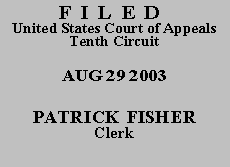

| CLARENCE R. BRAMLETT,
Petitioner-Appellant, v. RANDY G. WORKMAN, Warden, Respondent-Appellee. |
|
Petitioner Clarence R. Bramlett appeals from the district court's order entered following a remand by this court, see Bramlett v. Champion, 28 Fed. Appx. 868 (10th Cir. Nov. 30, 2001), directing that the district court hold an evidentiary hearing in this matter filed pursuant to 28 U.S.C. § 2254. We affirm.
In 1990 Mr. Bramlett was convicted of first-degree murder following a jury trial and was sentenced to life without parole. He filed an appeal to the Oklahoma Court of Criminal Appeals, which was denied. Mr. Bramlett filed a state application for post-conviction relief raising claims different from those raised on direct appeal. The state courts denied relief. Mr. Bramlett then filed this petition raising the same seven issues he raised in his state application for post-conviction relief. The district court denied relief, but granted him a certificate of appealability on two issues: (1) whether the prosecution withheld exculpatory evidence in violation of Brady v. Maryland, 373 U.S. 83 (1963), and (2) whether trial counsel was ineffective for failing to investigate and present exculpatory evidence.
This court affirmed the district court's decision on the ineffective assistance of counsel claim, but remanded the case for an evidentiary hearing on Mr. Bramlett's Brady claim. Mr. Bramlett alleged that the state violated the constraints of Brady because it suppressed evidence that four witnesses had informed the police prior to trial that Mr. Bramlett was not the shooter, and that, regardless of these statements, the police and/or the prosecution coerced the witnesses into identifying Mr. Bramlett as the shooter at trial.
At the hearing the court heard testimony from two of the witnesses, the prosecutor, the lead detective in the case, Mr. Bramlett, and a school teacher who knew the individual alternatively identified as the shooter. The district court considered the record before it and the testimony given at the hearing. The court determined that Mr. Bramlett and his witnesses were not credible due to contradictions in the testimony at the hearing, the fact that one of the recanting witnesses did not testify at Mr. Bramlett's trial, and the objective evidence.
On appeal Mr. Bramlett argues that the district court erred in assessing the impact of the testimony presented at the evidentiary hearing. But we defer to the district court's credibility determinations. See Romano v. Gibson, 239 F.3d 1156, 1175 (10th Cir.), cert. denied, 534 U.S. 1045, 1046 (2001).
We have reviewed the appendix submitted to this court, including the transcript of the evidentiary hearing. The district court's credibility determinations are supported by the record, as are the conclusions drawn by the court. Therefore, we AFFIRM the judgment of the district court for substantially the reasons stated in its order of July 22, 2002.
Entered for the Court
Circuit Judge
*. This order and judgment is not binding precedent, except under the doctrines of law of the case, res judicata, and collateral estoppel. The court generally disfavors the citation of orders and judgments; nevertheless, an order and judgment may be cited under the terms and conditions of 10th Cir. R. 36.3.